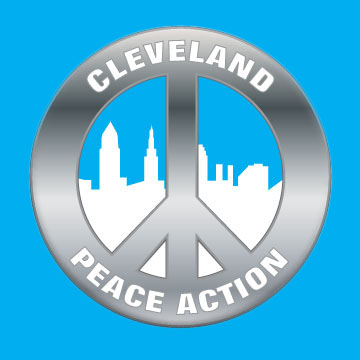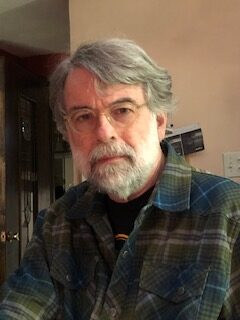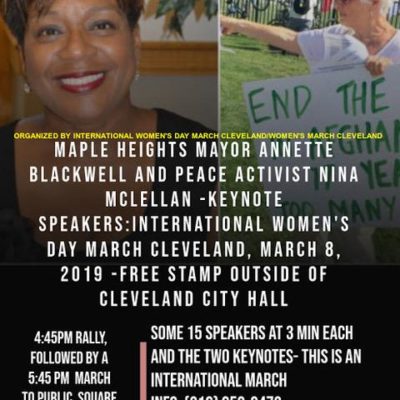Remarks by Francis Chiappa at “Remembering Hiroshima and Nagasaki,” August 7, 2022, Rockefeller Lagoon, Cleveland, Ohio.
In the aftermath of Hiroshima and Nagasaki, the United States and the Soviet Union began a race for dominance. As our government furiously developed bigger and better bombs, it sought to pathologize fears of nuclear war and radiation, calling it “irrational,” as well as implying that such fear was unpatriotic. The politicians and the military brass were thinking a nuclear war could be won. But, hedging their bets, they relied on massive deterrent capability, where an attack by one side would result in “mutually assured destruction.” Some people thought this was insane. But the great majority coped through “psychic numbing.” They were indifferent to the possibility of holocaust, even as their governments made it more likely. With trauma, we humans tend to shut down emotionally, to minimize our fear, to not think about it. Psychiatrist Robert Jay Lifton coined the term “psychic numbing” to describe how we deal with collective trauma. Wikipedia puts it this way: “Psychic numbing is about the way a culture or society withdraws from issues that would otherwise be too overwhelming for the human mind to comprehend.” It’s a challenge to comprehend the horrors of slavery. Or the Native American genocide. Or the long-term consequences of climate change. Or the threat of nuclear war.
“We the people” finally broke through denial and numbing in the early 1980’s. We mobilized. We helped people locate where they lived, on a city map, so they could see exactly what would happen if a missile landed downtown. We organized for the Nuclear Weapons Freeze Campaign. No more research, testing or deployment of US weapons if the Soviet Union would do the same. Public support for it topped out at 80%, at a time when there were 60,000 nukes on Earth. Though the Freeze never passed in Congress, it was a major factor in Presidents Reagan and Gorbachev seeing the light, even coming to the belief that nuclear weapons should be abolished. These two men began negotiating and warheads were eventually reduced to the 15,000 we now have.
The US public was well-informed back then about the threat of nuclear war. The Berlin Wall was dismantled, the Soviet Union broke apart, the Cold War was finally over. The threat of nuclear war quietly slipped beneath our collective threshold of awareness. It was too just much to KEEP thinking about it.
The Doomsday Clock, the risk indicator of the Bulletin of the Atomic Scientists, is set at 100 seconds to midnight. For the last three years, we’ve been as close to Armageddon as we’ve ever been. But the great majority are largely unaware of the danger. With international tensions and instability escalating, accidental or intentional nuclear war becomes more possible. But psychic numbing prevails. The cure for psychic numbing lies first in awareness and then in action.
Secretary of State Antony Blinken, this year at the UN, reaffirmed “the ultimate goal of a world without nuclear weapons.” President Vladimir Putin reportedly said that he “didn’t think nuclear war was good for anyone.” Meanwhile, the US military brass was again talking, in 2019, about winnable nuclear wars. We don’t know what President Biden is thinking because the most recent Nuclear Posture Review is classified information.
Why should we worry about nuclear war?
- The US, under Donald Trump, withdrew from the Iran nuclear deal.
- Tensions have escalated with China, most recently over Taiwan.
- A global nuclear arms race is underway, as other nations follow the example of the US.
- The invasion of Ukraine has engaged the two largest nuclear weapon states in a proxy war, which both sides seem to relish, and which has no end in sight.
- Russia has occupied a Ukrainian nuclear power plant and is using it as a missile base. This undermines international controls on fissile material and is a few different accidents waiting to happen.
Our national leadership will do absolutely nothing without pressure from us, from “We the People.” Here’s what we must tell our government to do:
- Declare a No First Strike policy: we should announce that US will not be the first to use nuclear weapons! Period. Of course, this would apply in the Russia-Ukraine war.
- Halt nuclear arsenal modernization, with its projected cost of $1T over 30 years – it’s a waste of money, it’s unnecessary for deterrence and it fuels the global arms race. It puts us in greater danger.
- End the Russia-Ukraine war. Don’t accept the idea of endless war. Concessions must be made on both sides. Negotiate peace.
- We must sign the Treaty on the Prohibition of Nuclear Weapons, joining 122 other nations, none which have nuclear weapons.
- If we’re serious about a world without nuclear weapons, we must break through psychic numbing. We must take action.




Leave a Comment